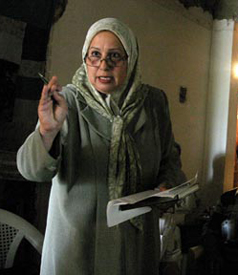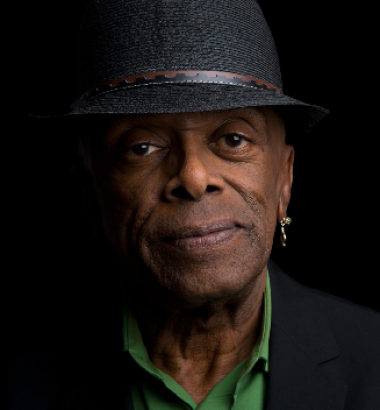Early in the morning of July 21, police stormed the offices of the Iraqi Electrical Utility Workers Union in Basra, the poverty-stricken capital of Iraq's oil-rich south. A shamefaced officer told Hashmeya Muhsin, the first woman to head a national union in Iraq, that they'd come to carry out the orders of Electricity Minister Hussain al-Shahristani to shut the union down. As more police arrived, they took the membership records, the files documenting often-atrocious working conditions, the leaflets for demonstrations protesting Basra's agonizing power outages, the computers and the phones. Finally, Muhsin and her coworkers were pushed out and the doors locked.
Shahristani's order prohibits all trade union activity in the plants operated by the ministry, closes union offices, and seizes control of union assets from bank accounts to furniture. The order says the ministry will determine what rights have been given to union officers, and take them all away. Anyone who protests, it says, will be arrested under Iraq's Anti-Terrorism Act of 2005.
So ended seven years in which workers in the region's power plants have fought for the right to organize a legal union, to bargain with the electrical ministry, and to stop the contracting-out and privatization schemes that have threatened their jobs.
The Iraqi government, while seemingly paralyzed on many fronts, has unleashed a wave of actions against the country's unions that are intended to take Iraq back to the era when Saddam Hussein prohibited them for most workers, and arrested activists who protested. In just the last few months, the Maliki government has issued arrest warrants for oil union leaders and transferred that union's officers to worksites hundreds of miles from home, prohibited union activity in the oil fields, ports and refineries, forbade unions from collecting dues or opening bank accounts, and even kept leaders from leaving the country to seek support while the government cracks down.
At the U.S. Embassy, the largest in the world, an official says mildly, "We're looking into it. We hope that everybody resolves their differences in an amicable way." Meanwhile, however, while the U.S. command withdraws combat troops from many areas, it is beefing up the military and private-security apparatus it maintains to protect the wave of foreign oil companies coming into Basra to exploit the wealth of Iraq's oil fields.
Is destroying Iraq's labor movement a way to ensure an environment in which giant oil corporations can operate freely, and the Iraqi government can institute further market-based reforms? That was a logical question during the Bush administration, when its neoconservative advisors openly predicted Iraq would become a beachhead for privatizing the public sector of countries throughout the Middle East. Their policy, however, has not ended with the change in administration. And today, Iraqi labor is paying for its devastating consequences.
Iraq's history highlights the bitterness unions might feel over this situation
Iraq had labor unions before any other country in the Middle East. Workers organized themselves when the British drilled the first wells and built the first railroads after World War One. The British, however, banned unions, driving them underground. They installed a Saudi sheikh as king, but kept enough control to ensure that the oil wealth flowed into the bank accounts of British companies (BP's predecessors), while Iraqis remained desperately poor. The king, meanwhile, threw workers who tried to organize unions into prison.
A revolution in 1958 overthrew the king. Unions came aboveground so fast that Baghdad's May Day march in 1959 brought out half a million people, when the country's total population was only 10 million. That revolution didn't last long, however. By 1963, the Ba'ath Party had mounted a coup. To help it into power, the CIA gave it lists of thousands of Iraqi leftists and union activists, who were imprisoned and murdered. After a decade of more coups and counter-coups, Saddam Hussein seized control.
Despite years of repression, Iraq's nationalists were still strong and popular enough to force the nationalization of oil in 1972. To deal them a deathblow, in 1987 Saddam Hussein issued the infamous Public Law 150. Unions were banned in public enterprises, from oil and power plants to factories, schools and hospitals. Again, as they had under the king, union activists went to prison, went underground or left the country. And as they did, Donald Rumsfield, later George W. Bush's Defense Secretary and architect of the occupation, shook Saddam's hand in an infamous photograph, promising the dictator intelligence briefings and arms to fight his war with Iran.
It's a little hard to understand why Iraqi leftists and union activists were willing to see the 2003 U.S. invasion as a step towards democracy. But most saw the end of the Saddam Hussein regime as the precondition for any change.
U.S. troops moved into Basra from Kuwait on the morning of April 9, 2003, and American tanks pulled up to the gate of its huge, dilapidated oil refinery. After thirty years of Saddam Hussein, most workers there had had their fill of war and repression. They were prepared to welcome almost any change, even foreign troops. "We were ready to say hello," recalls Faraj Arbat, one of the plant's firemen.
The soldiers trained guns on them, and when the head of the fire department protested, he was ordered to lie facedown on the ground. "Abdulritha was absolutely shocked," Arbat recalls. "But he did as he was ordered. Then an American put his foot on his back. So we started fighting with the soldiers with our fists, because we didn't understand. The tank turret started to turn toward us, and at that point we all sat down." Someone easily could have died that day. As it was, the memory of the foot on Abdulritha's back left a bitter taste.
The refinery workers had already labored through the "shock and awe" bombing prior to the invasion. "Slowly we got production restored, by our own efforts," Arbat remembers. "Electricity workers, at their own expense, brought power back to the refinery. Meanwhile, the Americans and British began coming with tanker trucks, load
ing up on the gas and oil we were producing."
For two months, no one got paid. Finally, Arbat and a small group began to organize a union. "At first the word frightened people, because under Saddam, unions were banned," he explains. Nevertheless, a few dozen of the refinery's
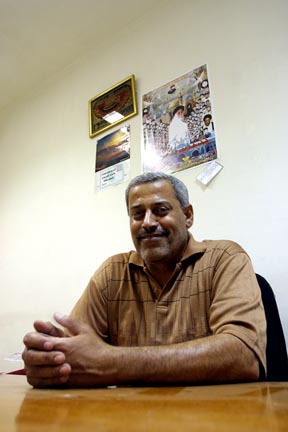
3,000 employees came together and chose Arbat and Ibrahim Radiy to lead them.
To force authorities to pay everyone, the small group took a crane out to the gate, and lowered it across the road. Behind it, two dozen tanker trucks pulled up with a heavily armed military escort. "At first there were only 100 of us, but workers began coming out. Some took their shirts off and told the troops, 'Shoot us.' Others lay down on the ground." Ten of them even went under the tankers, brandishing cigarette lighters. They announced that if the soldiers fired, they would set the tankers alight.
The soldiers did not fire. Instead, by the end of the day the workers had their pay. Within a week, everyone at the refinery joined; and. the oil union in Basra was reborn.
The occupation's program for transforming the Iraqi economy was announced by Paul Bremer, appointed by President Bush to head the Coalition Provisional Authority in mid-2003. It included the privatization of state-owned industry, especially transportation, ports, communications and most manufacturing.
In September 2003, Bremer issued orders 29 and 30. They lowered base wages from $60 to $40/month, ended subsidies for food and housing, allowed private ownership by foreigners of state enterprises (except oil), and permitted the total repatriation of profits outside the country. Bremer kept in force Public Law 150. As a result, Iraq's new unions were illegal. When power was handed over to an "independent" government in June 2004, the transitional law froze the Bremer orders into place.
Nationalist sentiment in Iraq views the public sector, especially oil, as a guarantee of sovereignty and a key to future economic development. Iraq's unions quickly became privatization's most vocal critics.
The first big fight over the US economic program came within months of the confrontation at the Basra refinery gate. KBR, a subsidiary of the oil services giant Halliburton, was given a no-bid contract to put out war-caused oil fires in the huge Rumeila fields. Within weeks, it had taken over the financial functions of Basra's civil administration. In order to get paid, workers had to take their timesheets to local KBR offices for approval.
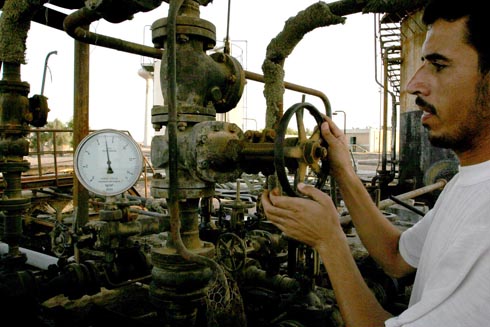
An oil worker in the Basra refinery.
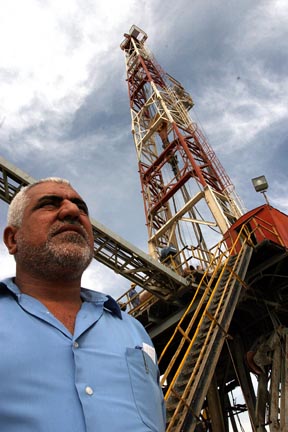
Then KBR claimed the work of reconstructing wells, pipelines and other oil facilities. With unemployment hovering at 70%, Iraqi workers saw a clear threat to their jobs. "It is our duty to protect the oil installations, since they are the property of the Iraqi people," explains Hassan Juma'a, who became president of the Federation of Oil Employees in Iraq. The new union gave KBR a deadline to leave the oil district, and when it expired, shut down production. "For two days we refused to pump a single drop until they left," says union leader Farouk Sadiq. "Other workers in Basra refused to work, too. It was independence day for oil labor."
KBR closed its offices in Basra.
That began a wave of union organizing in the south. With the help of oil workers, a new union in the ports of Um Qasr and Zubair forced two huge corporations, the Danish Maersk and Seattle-based Stevedoring Services of America, to give up sweetheart concessions they'd been given to operate Iraq's deepwater shipping facilities. In late 2003 the oil union threatened to strike again if Bremer's orders lowered wages. The oil minister caved in, bringing the base wage up to $85/month.
Help fight ignorance. Click here for free Truthout email updates.
Then the oil union helped workers in the power plants. After Hashmeya Muhsin was elected the new union's president, workers struck the Najibeeya, Haartha and Al Zubeir generating stations. They stormed the administration buildings and vowed to shut off power. The electricity minister also agreed to abandon Bremer's wage order. Muhsin's electrical union then battled to stop subcontracting in the power stations - a prelude to corporate control.
Union organizing at the refinery seemed spontaneous, but in reality-* relied on workers' memories of years of underground activity. In ports and power plants, organizers from Iraq's old unions, who'd come back into the country or up from underground, helped workers come together.
The unionization of the south was the leading edge of a wave that spread across Iraq. Strikes took place in Baghdad and other cities. New, often competing federations were formed. The unions organized by Iraq's Communists merged with the few Saddam had allowed in private businesses, to form the General Federation of Iraqi Workers. Others in many local workplaces merged into the General Federation of Workers Councils and Unions of Iraq, which was later joined by the oil workers. Teachers and journalists reorganized their old unions as well, which remained independent.
Since most Iraqi workers still work for government enterprises or services, almost all of them came up against Public Law 150. After elections resulted in a new government, and Bremer's Coalition Authority dissolved, a new constitution promised labor law reform. Instead, the government not only failed to repeal Law 150, but passed a succession of others designed to stop labor activity.
In 2005, Decree 870 gave the government the ability to take over unions, and prohibited them from setting up bank accounts or collecting dues. Unions continued to function based on the willingness of workers to support them, but the government sought to deny them the resources to grow.
In 2007, as the US was pressuring for a new oil law designed to ensure that the multinationals would gain access on the most favorable terms, the oil union mounted what was, in effect, a political strike. On June 4, the Federation of Oil Employees in Iraq shut down the pipelines from the Rumeila fields near Basra, to the Baghdad refinery and the rest of the country. It was a limited strike to underline its call for keeping oil in public hands, and to force the government to live up to its economic promises.
Iraqi Prime Minister Nouri al-Maliki called out the army and surrounded the strikers at Sheiba, near Basra. Then he issued arrest warrants for the union's leaders. U.S. aircraft buzzed and overflew Basra during and after the strike, increasing pressure on the union. In Iraq, the hostile maneuvering of military aircraft isn't considered an idle threat by the people below. On Wednesday, June 6, the union stopped the strike. Maliki, who faced the possibility that it might escalate into shutdowns on the rigs themselves, agreed to the union's principal demand. Implementation of the oil law would be held in abeyance while, while the union posed objections and proposed alternatives.
Even in the U.S., voices were raised saying that oil privatization was a bad idea. Congressman Dennis Kucinich charged, "Privatizing Iraq's oil is theft." Nevertheless, the U.S. threatened to withhold a billion dollars in reconstruction financing if Iraq didn't pass the Hydrocarbon Act. Maliki faced a fact that U.S. policymakers refused to recognize. The oil industry is a symbol of Iraqi sovereignty, and handing control to foreign companies is extremely unpopular.
The oil workers union, still technically illegal, emerged as one of the strongest voices of Iraqi nationalism. Other demands reflected workers' desperate situation. They wanted the oil ministry to give permanent jobs to thousands of temporary employees. In a country where housing has been destroyed on a massive scale, the union wanted land for building homes. It demanded jobs and a future for young people graduating from the Oil Institute. Fighting for these demands made unions popular - the only force in Iraq trying to maintain a survival living standard for the millions of Iraqis who have to get up and go to work every day in the middle of a war. The U.S. authorities, on the other hand, seem to Iraqis like an enemy bent on enforcing poverty.
The rationale for privatizing Iraqi industries like electricity and oil in the U.S. press is that the state-owned industries are old and inefficient. U.S. engineering know-how was needed, occupation authorities said, to bring it up to modern standards. Arab labor leader Hacene Djemam bitterly observed, "War makes privatization easy: first you destroy society; then you let the corporations rebuild it."
But in electricity, they never did. U.S. contractors raked in billions in cost-plus contracts for rebuilding the power grid - General Electric alone got $3 billion. Yet Basra residents only get a few hours of electricity a day, while temperatures hit 120 degrees in the summer. Before the first Gulf War, Iraq generated 9,300 megawatts of electricity. The U.S. bombed plants and transmission lines in that war, and U.S.-imposed sanctions then kept many of them from being rebuilt. Production dropped to a third. Today, after seven years of "reconstruction" by U.S. contractors, production is only up to 6,000 megawatts, two-thirds of what it was twenty years ago. Meanwhile, Iraq's population has grown, and consumption increased.
U.S. contractors became notorious for supplying parts and generators to Iraqi power stations that were incompatible with existing equipment, and for showing up with an entourage of gun-toting private security. Meanwhile, Iraqi workers, who were often targeted by insurgents seeking to sabotage the system, did the actual work of keeping the plants running.
That explosive combination finally produced a huge demonstration on June 19, when Basra and Nassiriya residents poured into the streets with signs saying "Prison is more comfortable than our homes!" Police killed one demonstrator, Haider Dawood Selman, and shot others. In their wake, the electricity minister resigned, and Shahristani, who was already oil minister, took over electricity as well. When he issued his order to shut down the electrical union, another large demonstration brought out 1,000 workers in Basra to protest. Their shouted slogans asked Shahristani where the $13 billion appropriated for electricity reconstruction had gone, chanting, "Hussein, where is the electricity?"
Three weeks later, the union had been expelled from its offices.
Hashmeya Muhsin and Hassan Juma'a were among several Iraqi unionists who traveled to the U.S. looking for labor support in their battles against illegal status and privatization. U.S. Labor Against the War, a national organization of anti-war unions, organized several national tours for the Iraqis. They were invited to conventions of the AFL-CIO. The American Center for International Labor Solidarity (affiliated with the AFL-CIO) and the British Trades Union Congress began offering them material support and training at facilities in Jordan. As the conflicts in Iraq increased, however, the government moved to cut off that support. Unions were already prohibited from receiving money or even maintaining bank accounts. But after the leaders of two federations, Falah Alwan and Rasim Awadi, toured the U.S. in 2009, Maliki issued order No. 3-2004. In the future, union leaders would have to have permission from the Supreme Ministerial Committee to travel abroad. That permission, clearly, would not be forthcoming.
Even in public schools, unions felt the government closing in. This past January, the Maliki administration organized an effort to seize control of the Iraqi Teachers Union from its independent leadership. It ran a slate that teachers accused of being a front for Maliki's ruling party. The union president in Basra was thrown in jail. "He's receiving threatening phone calls such as, 'If you don't stop, we'll kill you,'" according to union leader Nasser al Hussain.
Death threats aren't taken lightly in Iraq. Since the beginning of the occupation, dozens of trade union activists have been assassinated. Iraqi unionists still mourn the death of Hadi Saleh, who was tortured and murdered in his Baghdad home in 2005 by killers so brutal that they emptied their guns into his body after they'd strangled him. Saleh was the most well-known of those labor activists jailed by Saddam Hussein, and later exiled, who then returned to Iraq to begin rebuilding its unions. Most think the killing was the work of former agents turned insurgents, from Saddam's old secret police, the Mukhabarat. In 2008 Shihab al-Tamimi, head of the Iraqi Journalists Syndicate [Union], was shot by gunmen in Baghdad. Al-Tamimi, an outspoken independent reporter, was a strong critic of the occupation and of sectarian violence.
In January pressure against unions in the oil districts escalated. Hassan Juma'a, president of the Federation of Oil Employees in Iraq, criticized refinery managers for cutting the food rations workers receive as a supplement to their low salaries. Overtime hours were cut, reducing income even further, and some workers were demoted. One manager said anonymously to correspondents from Iraq Oil Report that he feared some would be transferred as retaliation: "We are always under the threats from the oil officials to punish and to sack people who speak out about the problems in the oil sector." Juma'a's statement was followed a few days later by a protest by workers in the refinery itself.
In March, workers organized demonstrations throughout the oil district demanding pay increases, permanent positions for temporary workers, modernization of the equipment and facilities, and legal status for their union. Since the 2007 constitution, Iraqi unions had been promised a labor law reform to abolish Law 150 and set up a structure under which they could function normally. In August, however, the parliamentary committee considering the draft law discarded it. That not only returned the reform process to its beginning, it left Law 150 and the bans on activity the only laws in force.
In April fears of retaliation were realized. Five union leaders were transferred from the Basra refinery to Baghdad, hundreds of miles away. They included Ibrahim Radiy, who had lowered the crane across the road in the confrontation where the union was born seven years earlier. Others included Alaa al-Basri, Majid Ali, Khaza'al Hamoud and Faraj Misban. South Refineries Company spokesman Qassem Ramadhan admitted that the transfers were punishment for earlier worker protests.
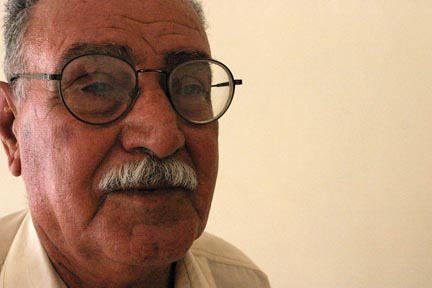
Muhsin Mull Ali, a retired longshoreman and grandfather of the labor movement in Basra. After being imprisoned under the king, and then by Saddam Hussein, he left Iraq and later returned to help longshoremen reorganize their union.
In June, repression spread to the ports south of Basra. Leaders of the longshore union there were transferred 1,000 kilometers from their worksites, and when workers protested, management brought in military units who surrounded the demonstrators. Finally, on June 1, as electricity workers filled the streets of Basra, the Southern Oil Company issued arrest warrants for Hassan Juma'a and Faleh Abood Umara, the oil union's general secretary, who was held for two days. The two were accused of "impeding the work," and "urging workers to stand against senior management," according to Umara. Oil Ministry Spokesman Assam Jihad told the Iraq Oil Report that, "The problem is that the unionists instigate the public against the plans of the Oil Ministry and its ambitions to develop (Iraq's) oil riches using foreign development."
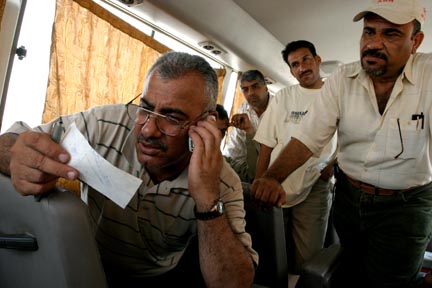
Faleh Abood Umara, general secretary of the oil workers union.
The Iraqi Parliament, under siege by Iraq's unions and nationalist parties, was never able to finalize the Hydrocarbon Law, despite intense pressure from the Bush administration. But the Maliki government found ways to let the companies in. In the huge oil fields around Basra, it held auctions for contracts to provide services to the Iraqi National Oil Company. Those services included expanding production in existing fields, and exploring new ones and bringing them on line. The Maliki government predicts oil production could rise from its present 2.6 million barrels per day to 12.5 million within seven years.
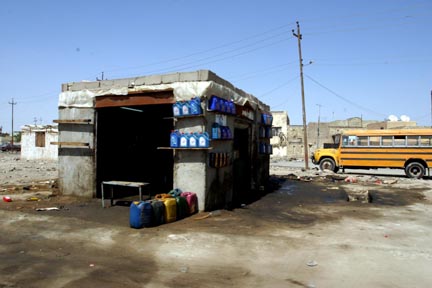
A shack where people sell gasoline and motor oil to passing cars.
Contracts were awarded to 18 companies, including the U.S. Exxon/Mobil, the European Royal Dutch Shell and Eni, the Russian Gazprom and Lukoil, Malaysia's Petronas and Chinese state firms. A partnership between BP and the Chinese National Petroleum Corporation got the contract for the giant Rumaila field.
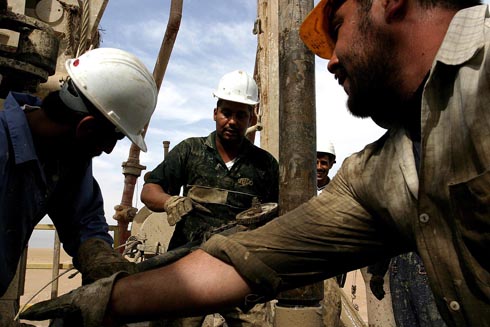
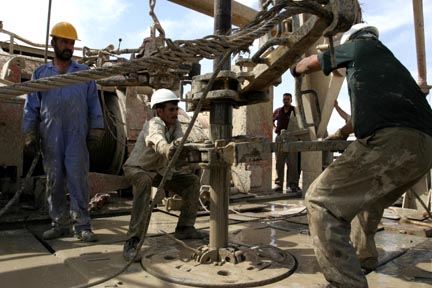
Workers on a drilling rig in the Rumaila oil field.
A former Iraqi Parliament member, Shetha Musawi, sued the government over the contracts, accusing it of essentially extorting loans from recipients, including $500 million from BP/CNPC, $300 million from Eni, and $400 million from Exxon Mobil, according to the Iraq Oil Report. Some loans were replaced with $100 million non-refundable "bonuses." The Iraqi court ruled she had to pay hundreds of thousands of dollars to hire outside oil consultants to make her case, and then she began receiving death threats. When the case came to a hearing, she didn't appear in court, and it was dismissed.
Meanwhile, the U.S. military took over the former British base in Basra, converting it to a center for helping oil company executives and personnel begin operations in Iraq. While Musawi faced her threats alone, and Iraqi unionists were expelled from their offices and jailed, the executives who sought contracts and labor peace found the U.S. military placed at their service. General Ray Odierno, head of U.S. forces in Iraq, told reporters, "There is good coordination going on with all the oil companies and the Basra operational camp." Odierno predicted that, despite the departure of combat troops, the U.S. would maintain forces to provide security there and in the oilfields. In addition, security contractors will supply thousand of private soldiers, paid the U.S., to provide additional protection for assets it believes must be guarded. That will undoubtedly include oil.
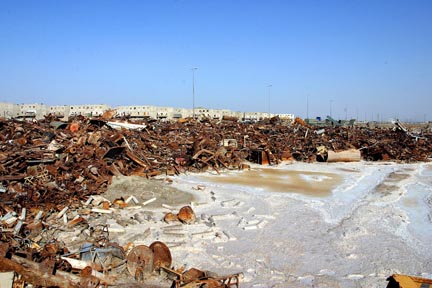
The wreckage of war - tank treads and turrets - in the middle of a residential neighborhood. The wreckage includes depleted uranium ammunition, a big health hazard to residents.
Last month, U.S. Ambassador Christopher Hill invited oil executives and diplomats to the base, known formally as Contingency Operating Base, Basra, for a fancy lunch. They talked about ways to facilitate visas for employees they intend to bring in. Ambassador Hill offered help in easing the way for the billions of dollars the companies will be transferring. The Iraqi oil union, meanwhile, can't even open a bank account.
According to Kenneth Thomas on the Basra Provincial Reconstruction Team at the U.S. Embassy, "U.S. government policy at this time is that the USG in Iraq should assist in facilitating the mobilization of these companies without regard to the nationality of the companies." Bremer couldn't have put it more plainly.
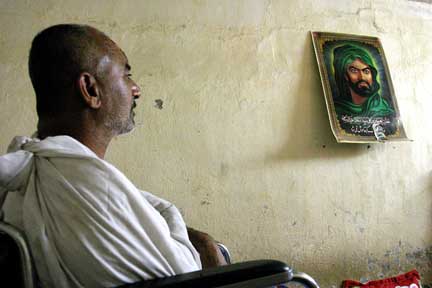
A worker disabled in a refinery accident at his home in Basra. A picture of the Muslim martyr Hussein, the founder of Shiite Islam, is on the wall.
Iraqi unions, meanwhile, have not gone underground nor have they stopped their efforts to organize. In fact, days after Hashmeya Muhsin and her coworkers were driven from their offices, she, the oil workers and Basra's other unions held a meeting to put aside their organizational differences and cooperate on resisting the government's effort to extinguish them. Unions in Europe and the U.S. sent messages in support, and AFL-CIO President Richard Trumka wrote to Maliki protesting the actions against the electrical workers.
The Basra unions formed a Joint Committee for Defending Unionism Rights in Iraq. "We shall carry on our struggle through all peaceful means like protests and strikes," Muhsin promised.









